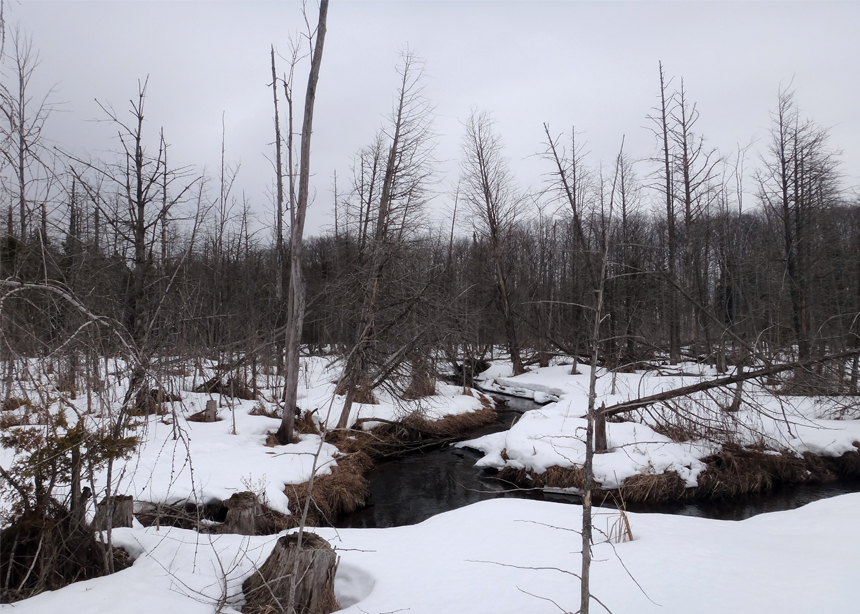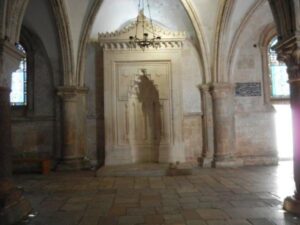As I write this, the birds are flying south. Their migration has me thinking about pilgrimage. I wonder about Mennonite understandings of pilgrimage, and what place pilgrimage might have in our lives and faith.
For much of Western Christian history, pilgrims went from their home to a sacred place, often one where the relics of saints were kept, and then returned home. Post-Reformation, those who left the Catholic church quit seeking relics, but the appeal of practising pilgrimage lingers. I hear about it repeatedly in various Mennonite circles, though ideas have changed.
Some people follow the old model to some extent, walking famous pilgrimage routes like the Camino de Santiago in Spain. However, these pilgrimages are often truncated. The destination isn’t the focus anymore; the journey itself is the place to meet God. Often the traditional destination, such as the Cathedral of Santiago de Compostela in Spain, isn’t even on the itinerary. In addition, rather than beginning and ending at home, the pilgrim takes a jet to a point on the route, then begins the pilgrimage, ends it somewhere else on the route and flies home.
How do these changes affect the experience?
I think part of the motivation behind these pilgrimages is that our faith hasn’t fully, deeply naturalized in this continent.
But I have also heard about other kinds of sacred places, ones on this side of the ocean. While we rarely use the language of pilgrimage to talk about them, I think they partially fill that niche. For Mennonites in Canada, I can think of at least three sorts of pilgrimage destinations.
First, people with family histories on this continent and/or in this denomination visit places like the Mennonite Heritage Village in Manitoba and Brubacher House in Ontario. Some destinations are more personal—I just revisited a farm near Guelph, Ontario, where I spent formative years of my childhood.
Of course, some of us also follow our family lines back across the ocean, visiting Ukraine, the Netherlands, Switzerland and other points where our ancestors lived. (Is the Khortitza Oak a Mennonite relic?)
Second, many of us love going to wilderness places, usually national or provincial parks, to experience God’s presence. In those places, we are on high alert, not just because there might be bears and moose and rattlesnakes nearby, but also because God might be there.
Third, many of us have connections to a sort of hybrid of those two pilgrimage destinations: church-related summer camps. These are special places in individual faith journeys while also including an element of commonality of experience, as with pilgrims in the past.
But our trips to these special (sacred?) landscapes don’t quite fit the traditional model of pilgrimage. Here the journey isn’t the point at all; God isn’t expected to show up on the highway. And while the destination can guide us toward God, that guiding is subtle. Often, our talk about these places is more about the generations who came before us, or the beauty and harmony of rocks and trees, or experiences of community and belonging, rather than using distinctly Christian vocabulary.

A less distant longing
In both the older and newer forms of pilgrimage, the goal is to seek God and find personal renewal by going somewhere else. I feel distinct discomfort with this.
Certainly, we cannot fully comprehend the majesty and magnitude of our Creator if we know only one corner of creation, and I am as restless as any human, but I wonder whether the transformation comes home with us, or whether it is mostly experienced while we are away.
If we keep seeking God far from where we live, what does that say about our appreciation of our home place, and our alertness to God in our daily lives here?
This is an especially urgent question for me because trips to seek God in far-off places are not without cost.
I live in ordinary farm country, which I happen to love, and where I happen to sometimes think God is around.
Increasingly, I am aware that our home ecosystems—like the areas surrounding the 100 acres my family and I call home—are being sacrificed to accommodate modern ways of life. This involves locating sacred places somewhere else. Ordinary places supply the food and fuel people need to drive through, or away from, as they go looking for places where they might catch a glimpse of God.
Our area suffers from loss of human community and various ecological shifts like less predictable weather, loss of wetlands, increased size of fields, reduced crop rotations and destruction of fencerow trees—much of this due largely to shifts in farming driven by the larger economic and social system we all participate in.
My home habitat, a country of small fields and pastures, of mixed hardwood and coniferous forest, of cedar swamps and cattail marshes, is not particularly remarkable. But if I can’t find traces of our Creator in a cedar swamp, where am I going to look?
Maybe I speak about pilgrimage too much as an outsider, and maybe my definitions are too rigid. The pilgrimage experiences I describe have not been central to my formation.
I feel the draw of pilgrimage, but I’m not quite comfortable with either of the models I’ve heard about. I keep wondering what Christian, and particularly Mennonite, pilgrimage on this continent would look like if we tried to hold together both the journey from home to home, and a destination which holds some special significance for our faith.
What if our perspective on pilgrimage included a recognition of the good in our home place and in all of creation, and a determination not to sacrifice some places in our efforts to see other places?
Maybe exploring pilgrimage is part of my inheritance. My last name, chosen by my parents when they married, means “return” in German, the language of our ancestors.
As I watch the birds go, I know they will return next spring. And I know that, on larger and smaller time scales and distances, we all go and return in one way or another. In my work to subsist sustainably, caring for land and other people in a rather small way, I often struggle with feeling that I am just seeking to turn the clock back to some imagined golden age in the past.
But as I reflect on pilgrimage, I don’t think so. Instead, I see many aspects of my daily life—cutting firewood by hand, listening to owls calling in the night, learning how Swedish farmers prepared for winter, noting the changes in where tamaracks grow in our cedar swamps—as pilgrimage. This work involves going from the familiar to search for a new way of living, caring for the familiar creatures God created. It is learning from the remarkable knowledge gained in this era of fossil fuel use and turning it to wisdom for the difficult daily life we will have to practice after it ends. It is expecting to glimpse God’s imprint in nature during the daily rhythm of living, rather than just in flights away from it. It is, in a way, looking for holy relics everywhere, and living where they are found.







Leave a Reply
You must be logged in to post a comment.